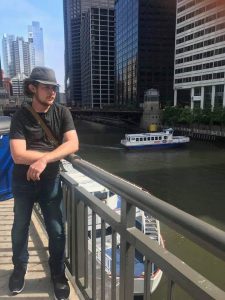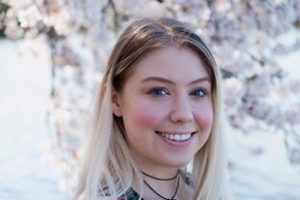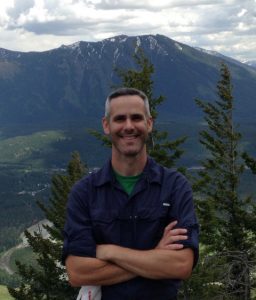Litter Entries
By Dog Cavanaugh
Days 1 and 2
On the first two days, we did what they called shadow dumps. Several of us were in training. We followed people around outside different government buildings and watched them pick up litter and trash. When there was a big enough pile of bags, we helped carry them across the street to the compactors behind City Hall. Sometimes people talked to us about what they were doing, but mostly it was all about watching. Someone told us they did things this way because too many people baled on the job in the first week. Why spend so much effort training people who decide they’re too good for trash? We definitely felt like shadows.
No one knew anything about my background. They hadn’t asked for a résumé, or even a list of references. I figure I got the job because I appeared young and strong and at least semi-social and presentable. I was also actually interested enough in the work to ask questions during the interview — like why are some trash bags black and others this kind of clear blue?
Lorenzo Doxley is the crew chief for the City-wide Clean Team (CCT). Most people call him Dox. He worked his way up from ditch digging on an asphalt team to rubbish truck driver to crew chief. Dox wears CCT badge #0031. I became badge #0974. We all wear official forest-green tee-shirts that say CCT on them, except for Dox who wears full button-down twill work shirts and a walkie-talkie on his belt.
Day 3
On this, the third day, Dox pulls me aside and says I’m with him. He will turn me loose “when it seems apparent.” LOVE Park is going to be my beat — across the street from the Municipal Services Building, caddy-corner to City Hall.
“Okay now,” Dox says. “Need you to watch. They’s three of ‘em over there.” He swings a finger to the side without looking. I see a woman in an over-sized white tee-shirt — dirty bare feet, unwashed legs, swarthy brown skin, long gray matted hair. I also see a Black teen with big popping hyperthyroid eyes, matchstick arms and legs, bucked teeth, a shaved head, baggy jeans, and a tunic-like black 3X sweatshirt with the sleeves cut off. There’s also a shiny amber-skinned guy near a corner of the park. He’s round and fat and his jeans stick somehow just near the base of his butt. You can see a yellow-gray pair of boxers. His tee is two sizes too small for him, pinching his arms, making them look like loaves of rye bread. His skin is only slightly darker than mine.
All three slowly rotate their heads from side to side, staring at the ground, stepping carefully. It looks like an early morning martial art they’ve invented. The woman stops, squats, picks something up, puts it to her lips, and stands. It’s a two-inch stub of cigarette. She lifts the hem of her giant tee-shirt and slides a hand inside a tight pair of workout shorts. An orange lighter comes out pinched between the tips of two fingers. She ignites the stub, inhales, then closes her eyes. A half-smile tugs at her pursed lips. Smoke trails from her nose. She leans back and turns slightly towards the sun. Ripples of heat swarm the smoke around her face. She takes another deep pull and seems like she’s in ecstasy.
Dox nudges me and points again. Two older people, a man and a woman, stand over a trash can. “They looking for the easy ones.”
“Easy?”
“Folks smack out smokes with they foot, then actually put ‘em in the trash. Like Good Samaritans.” He smiles, then produces a pack of cigarettes from his shirt pocket. I watch him light up, then turn my face enough so that I won’t be forced to breathe his smoke. A big slap of heat flashes against my cheek. Someone walking close by says, “You could light a smoke with that bitch sun.”
“Just want you to know,” Dox says. He’s looking at the two people still digging through the trash. “Always give time in the morning. They do your work for you. And not just smoke butts. They take care of half drinks and leftover food, clothing, newspaper, stuff like that.”
I let my vision swim out and over the whole park. Dox takes another shot off his cigarette. “Gotta watch careful. Some of ‘em know to put shit in the cans. They the long timers. Pick up around here just because it’s something to do.”
His cigarette is only half spent, but he bends down from his seat and carefully nudges the ember out on the cement. I figure maybe he’ll slide it back in the pack for later in the day. Instead, he gently lays it on the bench and stands.
“Give twenty minutes more. Most of ‘em be up and do what they do. Then get in to your day.” I stand and stretch a little like I’ve just gotten out of bed. He gives me a chuckle. “Strange, huh, how you feel like them when you watch too much?” Before I can answer he says, “Come on then, I show you where we keeps the bags and pokes and brooms and other tools of trade you gonna need.”
We head around the perimeter of the park. “If you feel like all this is making you a little crazy, let me know. Remember, too, they changes up the people sometimes. We don’t know from days who we got. And just for the record, I do not know what happens to anyone.”
I should have paid more attention to those words, but I am too busy watching a beautiful blond woman in sunglasses and a tight business skirt strutting through the middle of everything on her way to work. It is surprising how much stuff I ended up collecting that day. I remember very well beginning to wonder about counting stuff and keeping a decent enough record of what I was doing.
Day 9
Dox declares to us at lunch today that LOVE Park is a jewel in Philly’s crown, but he also says it’s not officially called LOVE Park. The nickname comes from the statue of the word “LOVE” mounted on a rack at the park’s east corner. The real name is John F. Kennedy Plaza.
LOVE is spelled out as a block of four letters, two to a row, the big, gaping, sloppy O swung sideways. The fountain beyond the letters, in the center of the park, sprays water into the light-blue sky that streams off into the city’s white summer haze.
Beyond the LOVE statue and the fountain is Ben Franklin Parkway, which looks like a long, straight river flowing away from the center of things. The Art Museum of Philadelphia bobs off in the distance at the top of the hill ending the Parkway, with its famous Rocky steps from the movie. Jean Brown, who was in my shadow dump group, got assigned as the sanitation specialist in the Art Museum area. Dox told us she’s got more space than I do but less people who spend the day. He said that for some reason when the tourists are down there they don’t litter much. They like to run the steps and take photos with the Rocky statue off to the side at the bottom of the steps, but they take care of their litter.
Day 22
I collected 76 sections of newspaper today and 19 magazines. I also picked up 37 plastic bags blowing around, 11 hoagie wrappers (after the partially eaten sandwiches were devoured by my people), 103 plastic beverage containers, 19 Styrofoam™ salad clamshells, 7 empty pizza boxes, 6 glass bottles, 24 foam and/or paper coffee cups, and 143 cigarette butts. We have special blue bags for paper and plastic bottles. I tried talking to Dox about recycling the glass, but he said it was too dangerous. If you break any of the glass in a bag of recyclables, it means you have to throw everything away. Cardboard is a funny thing for us to deal with. People use it to sleep and sit on. We usually leave it. Somehow it takes care of itself.
I didn’t happen to count the clothes I picked up, nor the shoes that appear and then disappear. These are left by all the homeless people in the park when church groups arrive with bags of donated clothes. What gets left by one person usually gets picked up fast enough by someone else. The only clothing I had to deal with was drenched with body odor or was partially coated in some indeterminate kind of liquid.
Day 41
Today is hotter than yesterday. A few old men play chess, shirtless in the heat. A group of six are focused on a card game in the shade. A man and a woman lie together spooning on a bench in another shade patch. He is unshaven with long hair straggling off the back of an otherwise bald head; she has a severe gap between her two top front teeth and wears pink polyester slacks. I can tell she’s braless in her tee-shirt that says “Coca-Cola” in that famous stylized lettering.
Every once in a while, the man adjusts behind her and slips his hand under her shirt. I see him playing with her breasts. Two spent McDonald’s sacks lie on the ground in front of them along with wrappers and cups. I don’t know if this mess is theirs or not, but I don’t move to pick it up. They’re junkies without doubt because yesterday I watched them score whatever it is they put in themselves at this same bench. They gave each other double high-fives and kind of danced around a little, then they started making out to the point where sex was inevitable. I turned away. A few other people did, too. Now they are strung out sleeping.
Day 44
By far, the worst part of this job is picking up cigarette butts. They’re everywhere and somehow they’re also almost always separate and alone on the ground. No other litter gets near cigarette butts. So, they’re a pain to pick up, especially when they’re flattened after a heal crushing. I collected 154 today. They’re like little exotic dead roachworms. That makes about three hundred in two days. It’s insane, I know, but I’m going to keep that tally going. And, no, I am not saving them or anything like that. Also, I’m only talking about real butts here. I occasionally pick up stubs and halfies, but generally I leave them for the homeless and others.
Day 47
A short dark woman with a crew cut of copper-colored hair, missing a few front teeth, wanders up to me. She wears a seersucker smock thing and carries yellow foam rubber flip-flops in her left hand. I anticipate being asked for some kind of help or money, but I’m sure I’ve seen her around some, which might mean that she knows not to ask me. Regardless, I prepare myself.
“Do a nice job, boy.”
“Thanks,” I say. She gives me a big grin. I’m thinking fast. “I got nothing for you.” I intend to sound decisive, maybe even authoritative. It comes out like I’m an asshole.
“Can’t you take a compliment?” She puts her hand to her chin, looks from side to side. “But, okay. Give you a nice blow?” she whispers. “Take my teeth out.” She places her right thumb and forefinger in her mouth and removes her top teeth.
I try to laugh. “I’m fine.” Except, I’m also an asshole.
She shakes her head almost like she can read my mind, but also forgives me. “Been watching you.” She moves her index finger in and out of her mouth, then comes to a stop and raises her eyebrows. “I’m Emma. Pretty good when ain’t no teeth in.”
Emma might be in her late thirties, but her face is aged in too many directions. She could also be in her late fifties. I realize I can’t really tell whether she’s Latin, Italian, Black, or some kind of Asian. Probably other options, too. Maybe she’s some of everything like me. Everything and nothing, I think. How easy for people to do to me what they have to her.
“I’m sorry, Emma. I already have a girlfriend.” I offer this excuse as politely as my embarrassment will allow. I had a girlfriend, but I was moving too fast with my emotions and showing my vulnerable side a bit too much.
Emma takes a step back and shakes her head. “I dint say I’d bone you, boy. That’s different.” She puts her teeth back in and begins to rummage around in the pocket of her smock.
My confusion and embarrassment probably looked pretty funny from any vantage point in the park. “Hey, I just work here,” I manage.
“Wanted to share my gratitude is all.” I watch her move down the walkway. She’s got a full cigarette between her fingers and a blue lighter in her other hand.
A few hours later, I see Emma sitting in the shade of a trash bin I’d just emptied. She was staring down at the blue lighter in her hand, crying.
Day 55
I’ve taken to smoking sometimes when Dox offers me one. Sometimes, too, I find good stubs on the ground. I should probably leave them to people who need them, but somehow I’m getting that itch and it feels normal. Maybe everyone should see what I see.
Day 61
They’re unfolding stands all around the park today, getting ready for tomorrow night. I was told to be extra vigilant with all litter. Dox and I steam-clean the two piss areas on the north edge of the park. One is for men (it’s worse and more public). The other is for the women.
I’ve seen Emma crouching behind a large boulder with some of the other women, talking and wiping with beige napkins — mostly from Subway and Starbucks. Seeing women wipe themselves is very touching. They all have different ways of doing it. Some are quite decisive and swipe kind of hard. Some are quick and nonchalant, using one or two flicks and then they’re out of there. Others dab carefully. Emma keeps her eyes on the ground in front of her. A lot of them don’t. They look around to see if anyone is watching. I know I’m an asshole for making myself aware of any of this, let alone writing it down, but I mean it when I say it’s touching.
Day 62
“Gonna be difficult today,” Dox says, looking down JFK Parkway to where they’re constructing a stage at the base of the art museum steps. The stage is next to Rocky. Someone has put a flag or a robe on him. This is all nearly a mile down the parkway, but I can see red white and blue on Rocky, a flowing cape with sparkling stars, even from such a long distance, like they’re ignition buttons for a whole bunch of things that are going to happen soon enough.
I ask Dox why it’s going to be a hard day.
“Gotta keep ‘em from pissing here until tomorrow ‘round noon when new folks begin to arrive.” He waved his hand at the whole park. “You know any of ‘em yet?”
“I…well, yeah, some….”
“Get the word out, then. Tell them not to piss in them corners. Go down to the subway. I got it cleared with SEPTA. They leave ‘em alone. But keep your eye out. I hate cleaning this shit up, then having folks piss on it again before an event. ‘Specially because they’re probably getting replaced.”
“Replaced?”
He squints out at the park and shakes his head. “I told you, kid. Don’t worry about it. Who knows what? Just take it all on for me.”
I stage myself, switching back and forth between the two piss areas for a while after Dox leaves. When they amble up looking like they held it long enough, I step forward and point to the train station steps. “Gotta stay clean for the celebration. Subway’s cool for you today. We got permission.” People head down, but they look uncomfortable with what I’m asking them to do, more uncomfortable than seems normal.
Day 66
I drift around LOVE Park with my broom, my pan, my spike, and a black plastic bag tied to my belt. I follow free newspapers blowing all over slabs of granite wall. I have a special net I use to spoon things out of the fountain.
I didn’t make it down here over the weekend so I don’t know what happened, but today the homeless, even the regulars, are nowhere to be found. We have beautiful summer weather and a nice breeze. It’s not too humid. People of all kinds — except the homeless — mill around. Jetting a thick column of water a good fifteen feet in the air, the fountain alternates from red to blue to foamy white. Mothers and kids sit around, eating lunch, wading, throwing coins, and making wishes. A few younger professionals take off their shoes and socks and roll up their pants. They sit with their feet in the water eating lunch, talking on their cell phones. Two of them look like cleaned-up versions of the amorous junkies I’ve seen doing their thing. These two are dressed like young lawyers or investment bankers, but they’re being highly physical. Some people glance at them, amused, others are clearly perturbed. The coins will be gone by morning if my homeless people return.
Day 67
It’s the next day and a lot of my people are back, although I don’t see my girl Emma. Somehow, they’re more subdued. They seem oddly hung over, or run over, or something. A lot of them keep yawning. After the lunch hour, most of the office workers having come and gone, nearly all of my people are napping in the shade. A number use several layers of flattened cardboard for cushioning and their shoes for pillows.
Day 73
A new kid named Miggy has taken to sleeping all day on a subway grate. He appears to be pretty young, maybe sixteen. He wears baggy jeans, no shoes, and a dark blue tee-shirt too small for his belly which sags onto the grate when he rolls on his side. Cool air spins up from underground, but it smells like a mixture of Pinesol and piss. Miggy wakes up, talks to himself, heads off to the piss area, then comes back and lies down, curling one arm around the top of his head and the other under his face as a pillow. I find a piece of foam rubber in the trash late in the day and clean it off as best I can. When he gets up to pee I place the foam on the grate where he sleeps. He comes back, stares at the foam, then tosses it onto the sidewalk.
When he talks to himself sometimes, I hear, “I am not a toy. They can’t do that.” He whispers a good amount, but he also says those words over and over again out loud. “I’m not a toy.” It’s not like he’s actually mad, or annoyed even. It’s more like he’s trying to convince himself that he isn’t a toy. And that it actually shouldn’t be possible to make him feel like one. “They can’t do that.”
Day 78
I picked up my 10,000th cigarette butt today. I’ve been averaging a bit more than a hundred twenty butts most days. I started collecting lighters and matches people leave behind or drop, but I gave up counting those and pretty much everything else. I leave the good butts in small groups on different walls around the park. Some of the population here has become so accustomed to their situation that they skip my good butts and simply light up filters to smoke. That’s a nasty and probably deadly habit if ever there was one. These days, a lot of filters are made of plastic and fiberglass.
Day 86
Dox and I are doing what he calls tree bagging. The dry, gray-leaved oaks that Dox says don’t grow no matter what, collect plastic grocery bags. It’s easy to pick the low-hanging ones out, but inevitably some float high into the treetops and sit there for weeks and weeks until we liberate them.
Sometimes, too, bigger black plastic bags get caught high up. If you come by here during a rainy summer day, a lot of these people are still out playing cards and sipping beer wearing trash bags and using battered umbrellas abandoned by commuters in windstorms. I don’t know where the other people go who don’t have plastic bags or broken umbrellas. It’s like they just evaporate.
We use a telescoping pole with both a grappling hook and a pincher on the end to get the easy bags. Later in the morning Dox shows me how to change the hook and pincher for a pruning shear and how to run rope through the eyelets on the pole and then cut the branches where bags are too tangled for easy extraction.
“It’s always about sharp,” he says.
I wait between Dox’s cuts, watching the ground. Sometimes litter is nearly impossible to see. You need to wait for the wind to move it. But litter wants you to find it. This I’ve learned. It waits for the unification of a patient mind and the powers of nature. Sometimes clouds dull sunlight down to visible pulses and reduce the spectral register enough so that what was invisible under the usual sun can be glimpsed long enough to make it into your litter-hunting brain.
Dox keeps working the trees. “Sharp cuts through branches.” I watch him as best I can, but litter on the ground continues to move around. I need to know where it’s going in order to pick it up later. Sometimes I feel like the only person left to want the things I pick up.
Day 98
Weirdness is going on here. I’m picking up a lot more trash. Lots of Chipotle stuff. I’m not even sure where the nearest Chipotle is. There are some Taco Bell wrappers, too, and a lot of paper bags mixed in as well. Also, pizza boxes up the yin-yang. Doesn’t make sense.
Day 99
I hear the word “watch” everywhere. It’s coming out of new and different mouths. Younger people growing in numbers by the day. They make signs on the ground. They sit in large groups with one person standing and speaking. They talk about New York and Washington and the Presdient and the “ninety-nine point nine.”
Besides “watch,” I hear versions of words sprayed around like “envero,” “cleansion,” “banksy,” “justeece,” “force,” and “tentacles.” They wear black tees with big block white lettering on the back that says “WATCH.” I have no idea what this means and realize I don’t pay enough attention to TV anymore. Even though I collect them for a living all day, I haven’t read a paper in weeks. And I can’t remember when I did anything on the internet with my phone.
Late in the week, about a dozen cops show up on horseback. They wear knee-high, shiny black boots, silver helmets kind of like football ones without the faceguards, and black leather gloves that go half-way up the forearm. Most of these guys have on mirror shades. They just show up and sit astride their trusty steeds in what I figure has to be called a formation, looking down on the fountain area where the WATCH people make their signs. The kids converse in low voices, doing their best to ignore the cops and their horses. I understand something political is happening, but I honestly don’t have a clue what. It’s obvious I need to watch TV sometime soon. I stand on a bench at the periphery of things and realize I’m probably going to be okay if a riot breaks out because I’ve got my green CCT tee-shirt on. As I look out over the scene, though, I realize that all the homeless have completely disappeared again.
Day 100
This morning on TV, they showed people refusing to leave a park in New York City. They kept talking about “watching the center” and “big banks,” and “corporate interests.” Even though I was finally watching TV, I was still a bit confused. News coverage isn’t like it used to be. Everyone’s aware of the way cameras and commentators don’t go deep inside things anymore. These days it’s not so much fake as it is just really, really ambiguous and incomplete.
They interviewed a young Black man with a goatee who wore horn-rimmed glasses and a black polo shirt with an arrow pointing up on the left breast. “To be in the one-tenth,” he says with disgust, “you need to have twenty million or more. There are nearly one hundred and thirty thousand American citizens in that group. A whole city. I don’t know if we see them as evil so much as we just want them to help out and pay more in taxes. They have as much wealth as the bottom ninety-percent of the country. It’s very sad. Heartbreaking even.”
The news woman seemed a bit amused by this. She kept talking about the Vietnam War protests and Occupy Wall Street. I kept thinking about the civil rights demonstrations my mother used to tell me about. But I could also see that trash was really building up on the edges of that park in Manhattan. Horizontal planes push pieces of life no one wants out to the edges and corners. And yet, stuff people throw away is still connected to them until it is carted off to the landfill or burned in an incinerator.
Day 104
My job could very likely be coming to an end. I realized that about two hours into the morning. You can’t clean up trash fast enough when six hundred people are camping on granite slabs, surrounding a fountain in the heart of your city. I was sitting with a dark-skinned girl named Mallory who is one of the Watchers. She was eating tuna out of a can with a twig. Her hair was spun into alternating dreadlocks that were colored dark brown and a caramel shade that was almost golden in direct sunlight. She had a rainbow bandana around her neck. It was a warm morning. She said she liked how her black tee-shirt was heating into a fire. I was drawn to her because she was so cheerful and positive on such a hot morning.
“What do you do here?” she asked, swirling her stick around the edges of the can.
“Pick up litter, mostly.
She let her chin pop out, then snorted.
“It’s not funny,” I said. “Someone has to do it.”
“No. Sorry.” She looked me in the eyes and put her hand on my knee. “It’s just that….” She glanced out across the park. The fountain was spraying dark blue water straight into the air. “Sorry. Really,” she went on. “It’s just that we aren’t going to leave.”
“You aren’t?”
“No. That’s what watching means. We’re here to pay attention and observe. We’re going to grow. This is where everything will be watched. You are going to have a little city on your hands of people paying attention to everything around them. You can’t handle all the trash we’re going to create. We won’t let you. That’s part of everything.”
I stared at the dark blue water tumbling around in mid-air and wondered if any of the girls and young women I had tried to love in my life would understand what she was saying. This girl named Mallory seemed so much more in tune with life. Things really felt like they to mattered to her. She was definitely superior to me. I imagined she had studied the history of social movements. She was waiting for me to say something. The best I had was, “You all are the new Occupy, then.”
“Not Occupy,” she smiled, then shook her head somberly. “That was too confusing. WATCH is permanent until those clowns in Washington get rid of that regime of idiots.”
We sat in silence. I tried to focus on my breathing. There were people everywhere. You could smell butane camp stoves, frying food, the stink of hard-boiled eggs, and the heavy scent of coffee.
“Are you really a trash guy? I mean…sorry to say this, but you seem a bit too intelligent for that.” She leaned forward to catch my eyes again. “Plus, really? Picking up trash? For the man? Isn’t that a stereotype for someone like you? How about fighting global warming at least, or something important?”
I bobbed my head up and down, more like I was ducking than agreeing. “I was going to start grad school next semester,” I said, “but I think I could maybe stick with this through the fall. I’ll probably quit in December, take the month off, and then shift gears in January. I needed ground level, you know? Life the way no one thinks about it because no one cares.”
She put her tuna tin down next to me, then threw the twig into some bushes. “Wow. Grad school.”
“What do you do? I mean, where do you go?”
“I live with my parents and take classes at Temple. I make money waitressing sometimes. I’ve been thinking about starting a catering company. It depends….”
We both watched the blue water flowing into the air, then falling back into the pool, a roil of foam and dark noise. It was a column of something trying to get into the future. I wanted to say that to her. Instead, I said, “That water is the only non-human thing in this park that can move. It’s clean and innocent.”
“Innocent?”
“Pure,” I say. “Doesn’t have a shred of intelligence.” We sat in silence with that. I admit that I felt profound.
As I turned to see her face again, it passed through my mind that I might be able to fall in love with her. But she was gone. I didn’t even see her walking away.
Day 106
After Chinese take-out, I turned on the TV tonight. They were showing my park. Night shots: horses and glistening police; sharp red blurs; smoke, something more; people covering their faces, running; a few police on foot, dropping riot shields, batons out, long mesh fence-like contraptions used to surround groups of people; another group of cops using police bicycles to push people into corners near open vans. My best thoughts were about my people and how I was glad they were nowhere to be found. I also knew I needed to go back to school sooner rather than later.
Day 129
I said goodbye to Lorenzo Doxley today. I also said goodbye to Emma and handed her a twenty-dollar bill. It was the least I could do.
“This a tip?” she asked. “I dint do nothin’ for you.”
“No tip,” I said. “I just thought you could use it. I’m moving on, Emma.”
She folded the money into a tiny package and put it somewhere under her shirt. “Well, thanks.”
“You’re welcome.”
“You know what I’m a do with it, right?”
“Yeah,” I said.
“So, thanks as much as you can take.”
“You’re welcome, Emma…as much as you can take.”
“Where you goin’?”
“Back to school. It’s a little late in September, but they’re taking me anyway.”
She dropped her jaw, then bobbed her head and let her mouth stay wide open.
“Is that funny?” I asked
She shook her head. “Nah. Kind of sad more like. You going away to some school place and we be here same as ever looking to do what we want.” She took out her teeth. To tell the truth, it was kind of sexy the way she did it. “Little sugar for your long road?”
I shook my head and stood to go. “Emma, I truly don’t know if you’d be doing that for me, or if I’d be doing it for you. Either way…” I shook my head slowly back and forth, “…either way, we’d both be sad as hell when it was over.”
She put her teeth back in carefully. “You right.”
I turned to leave.
“Hey, you ever wonder what happens to us when other people come along?”
I thought for a moment. “Yeah. I do. I mean, I figure there have to be a lot of places you all know you can go to….”
She shook her head. “Not hardly. God is cruel and unknowing, Mr. Litter Man. You either take part in that or you miss out. And when you miss out, you might as well not even be living.” She gave me her big sly grin, then started to walk away. “Have a good enough life,” she said as she half turned back to me.
I raised a hand, then bent down to pick up a very nice, long cigarette stub. In the end, though, I left it lying on the edge of the walkway and went in the opposite direction. A few seconds later, I turned to see if Emma was watching me. There she was, picking up the stub I’d left, her blue lighter in her other hand.
Dog Cavanaugh is an Afro-Irish American author. He and his wife are based in Philadelphia.








